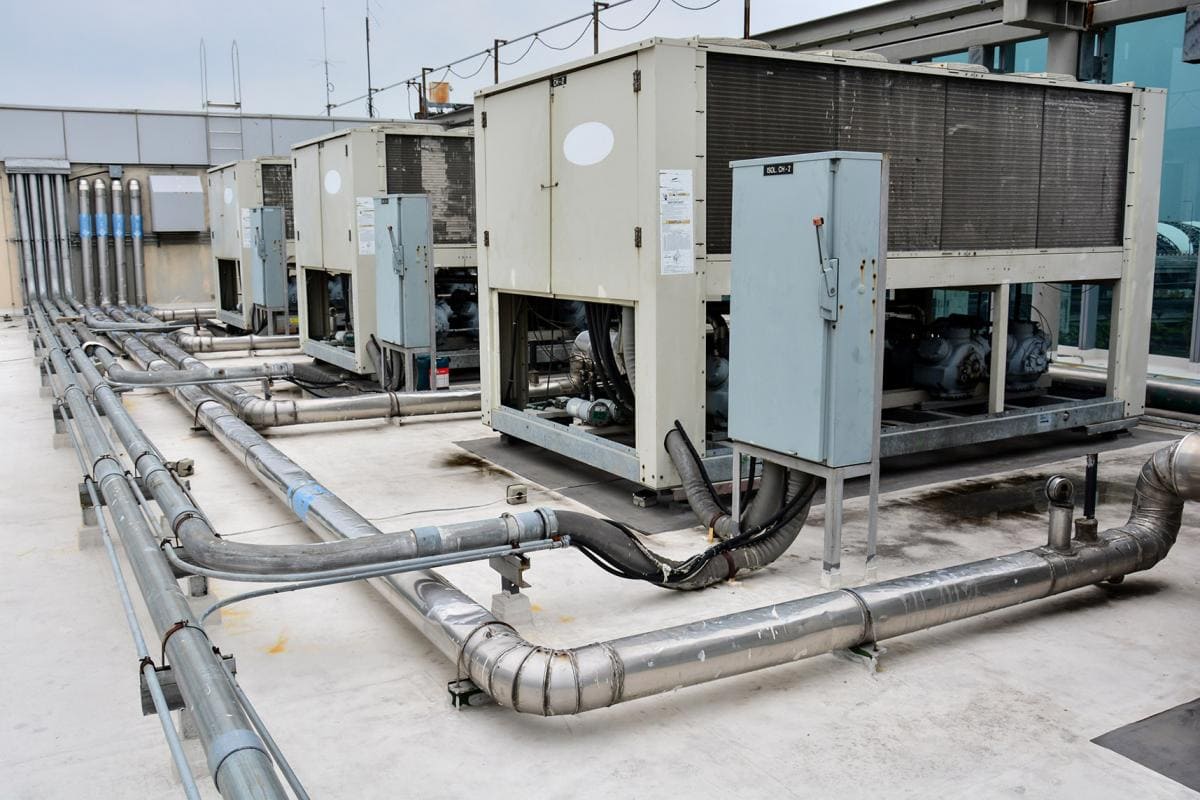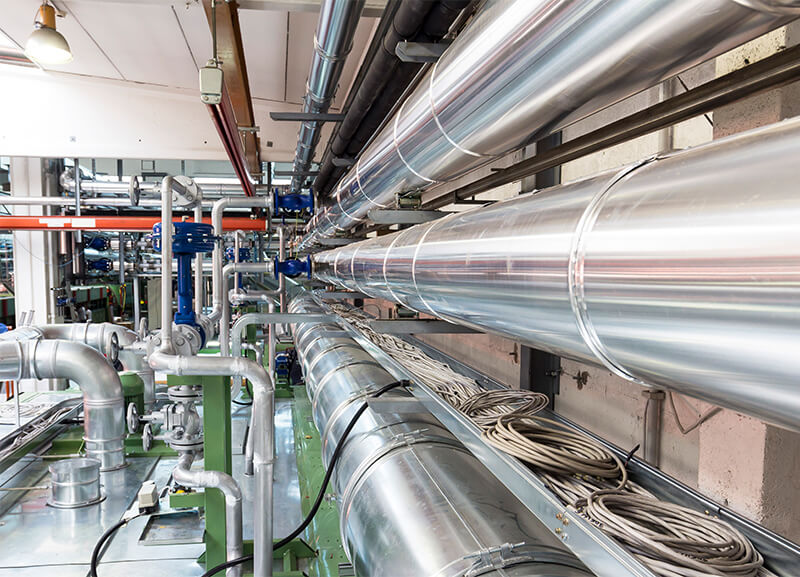See how HVAC experts help maintain low-cost systems all year
Wiki Article
Checking Out the Essential Components of an Effective HVAC System
An effective a/c system is constructed on several essential components that work in consistency. Each component, from the thermostat to the ductwork, plays an essential function in preserving convenience and energy effectiveness. Recognizing these elements is critical for enhancing efficiency and improving interior air high quality. As one analyzes these components, the elaborate partnerships between them reveal insights right into enhancing total system efficiency. What certain factors add most to this effectiveness?The Role of the Thermostat in Heating And Cooling Effectiveness
Although usually overlooked, the thermostat plays an important role in the effectiveness of HVAC systems. HVAC experts. This little gadget works as the main nerve center, regulating temperature setups and guaranteeing perfect comfort within a space. By precisely sensing the ambient temperature, the thermostat interacts with the air, home heating, and air flow conditioning devices to preserve the desired environment
An efficient thermostat lessens power consumption by triggering the a/c system just when required, thereby stopping excessive heating or air conditioning. Modern programmable and smart thermostats boost this efficiency additionally by enabling users to set timetables and from another location adjust setups, adjusting to daily regimens.
The positioning of the thermostat is necessary; incorrect location can lead to inaccurate temperature analyses, resulting in inefficient procedure. In general, a well-functioning thermostat not just boosts comfort yet additionally contributes significantly to power cost savings and the durability of the heating and cooling system.
Comprehending the Relevance of Air Filters
Air filters serve a crucial feature in HVAC systems by ensuring that the air distributing within a space stays clean and healthy. These filters catch dirt, allergens, and various other contaminants, stopping them from being recirculated throughout the environment. By capturing these fragments, air filters add to boosted interior air quality, which can considerably profit residents' health and wellness, especially those with allergic reactions or respiratory system problems.In addition, preserving tidy air filters boosts the efficiency of a/c systems. Stopped up filters can restrict airflow, causing the system to work tougher to keep preferred temperatures, resulting in raised power consumption and higher utility costs. On a regular basis changing or cleaning filters is a crucial maintenance step that can extend the life expectancy of heating and cooling tools. Eventually, comprehending the value of air filters permits home owners and structure supervisors to take positive steps to guarantee a well-functioning, efficient heating and cooling system that promotes a risk-free and comfy interior environment.

The Capability of the Furnace and Heatpump
Heating systems and heatpump are crucial elements of heating and cooling systems, liable for giving warmth during chillier months. Furnaces run by home heating air via burning or electric resistance, after that dispersing it throughout the home using air ducts. They typically offer fast heating and can be sustained by natural gas, electrical power, or oil, relying on the system type.Conversely, warmth pumps transfer warmth as opposed to produce it. They extract heat from the outdoors air or ground, also in low temperatures, and transfer it indoors. HVAC experts. This double capability enables heatpump to additionally offer cooling in warmer months, making them functional options for year-round environment control
Both systems call for appropriate upkeep to guarantee efficiency and durability. While furnaces master severe cold, heat pumps can be helpful in moderate environments. Understanding their unique functionalities help homeowners in picking the most ideal alternative for their home heating requires.
Exploring the A/c System
The a/c system is an important part of heating and cooling systems, readily available in various kinds to match different demands. Recognizing the efficiency scores of these systems is vital for making notified choices regarding power consumption and expense. This area will certainly discover the diverse kinds of ac unit and clear up exactly how effectiveness ratings impact efficiency.Kinds of Air Conditioners
While different aspects influence the option of a/c systems, recognizing the different kinds offered is crucial for house owners and building managers alike. Central air conditioners are designed to cool down entire homes or buildings, using a network of ducts for airflow. Home window units offer an even more localized service, ideal for small areas or single rooms. Portable ac unit give flexibility, enabling customers to move the unit as needed. Ductless mini-split systems are an additional option, integrating the efficiency of main systems with the comfort of zoning, as they require no ductwork. Geothermal systems harness the planet's temperature level for energy-efficient air conditioning. Each kind includes distinct benefits, making notified options crucial for reliable climate control.
Efficiency Rankings Discussed
Understanding efficiency scores is important for selecting the right cooling system, as these metrics offer insight into the system's performance and power usage. One of the most usual rating for a/c is the Seasonal Energy Performance Proportion (SEER), which determines the cooling outcome during a normal air conditioning period separated by the overall electric power input. A higher SEER suggests better efficiency. Additionally, the Energy Effectiveness Proportion (EER) is made use of for measuring effectiveness under details problems. An additional essential metric is the Power Star qualification, which signifies that a device meets rigorous power efficiency guidelines. By assessing these ratings, consumers can make educated options that not only optimize convenience but also decrease power costs and ecological impact.The Importance of Ductwork and Air flow
Efficient ductwork design and air movement management play vital functions in the total efficiency and efficiency of HVAC systems. Proper ductwork guarantees that conditioned air is dispersed evenly throughout a space, minimizing temperature variations and boosting comfort. Properly designed ducts minimize resistance to airflow, decreasing the work on HVAC equipment and inevitably lowering energy consumption.Air movement monitoring entails purposefully placing vents and registers to boost the flow of air. This protects against typical issues such as chilly or warm areas, which can occur when air flow is obstructed or inadequately balanced. In addition, the appropriate air duct products and insulation can further enhance efficiency by minimizing heat loss or gain during air transit.
A reliable ductwork system not only adds to energy financial savings however can also extend the life expectancy of HVAC equipment by reducing unnecessary stress (HVAC experts). Recognizing the importance of ductwork and airflow is necessary for accomplishing peak HVAC system performance.
Routine Upkeep Practices to Boost Performance
Routine maintenance practices are crucial for making sure peak look at here performance of a/c systems. These techniques consist of regular evaluations, cleaning, and essential fixings to keep the system running efficiently. Regularly altering air filters is crucial, as clogged filters can obstruct air movement and minimize performance. On top of that, service technicians need to examine and tidy evaporator and condenser coils to stop overheating and energy waste.Annual professional evaluations are likewise advised, as experienced technicians can recognize potential problems prior to they escalate. Lubricating moving components decreases deterioration, adding to a longer lifespan for the system. Additionally, ensuring that the thermostat operates appropriately aids in keeping excellent temperature level control.

Regularly Asked Questions
Just how Often Should I Change My Thermostat?
Thermostats must typically be replaced every 5 to 10 years, depending on use and modern technology developments. Normal checks are advisable to ensure peak performance, particularly if experiencing inconsistent temperature level control or raised energy costs.What Dimension Air Filter Is Finest for My Cooling And Heating System?
The best size air filter for an a/c system varies by unit layout. Typically, it's important to get in touch with the proprietor's manual or examine the existing filter measurements to assure peak efficiency and air high quality.Can I Set Up a Heat Pump Myself?
Mounting a heatpump individually is possible for experienced individuals, yet it requires expertise of regional codes and electrical systems. Working with a specialist is suggested to guarantee proper setup and suitable system learn the facts here now efficiency.Exactly how Do I Know if My Ductwork Is Reliable?
To determine ductwork effectiveness, one need to inspect for leakages, step airflow at vents, inspect insulation high quality, and review temperature differences between supply and return ducts. Expert analyses can offer complete understandings right into overall performance.What Are Signs My HVAC Demands Immediate Upkeep?
Indications that a heating and cooling system requires instant maintenance consist of uncommon sounds, inconsistent temperature levels, increased power expenses, undesirable smells, and regular biking. Attending to these issues immediately can avoid further see this site damage and guarantee optimal system performance.Air filters serve an essential function in Heating and cooling systems by assuring that the air distributing within a room remains healthy and tidy. Additionally, keeping tidy air filters boosts the performance of Heating and cooling systems. Ductless mini-split systems are another option, integrating the performance of main systems with the benefit of zoning, as they call for no ductwork. Comprehending effectiveness scores is crucial for selecting the ideal air conditioning system, as these metrics supply understanding into the system's performance and power consumption. The best size air filter for a Cooling and heating system differs by device layout.
Report this wiki page